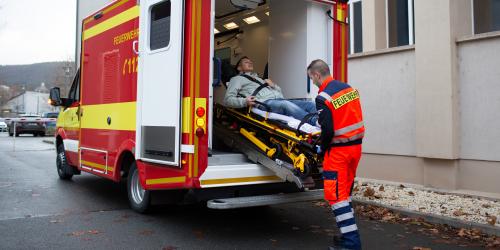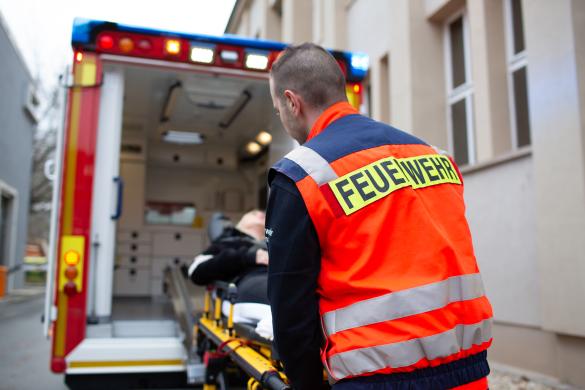
Emergency paramedic
As an emergency paramedic, you are the professional helper at the scene of an accident. You have to quickly get an overview of the situation, make decisions and take medical measures. In addition, you take care of the readiness of the vehicles and equipment. Another field of activity is the processing of emergency calls in the central control centre. The three-year training course is in accordance with the Emergency Paramedic Act.
The training begins on 01.09. of a year and extends over a period of three years. It takes place in the dual system. The vacancy is advertised in August for the coming training year.

Voraussetzungen
- Successful completion of secondary school
- medical certificate confirming health suitability for use in the rescue service
- possession of a driving licence class B
- Interest in medical issues of emergency medicine as well as pleasure and skill in dealing with technology
- Sense of responsibility, empathy as well as flexibility and ability to work in a team
The following is advantageous
- Participation in a volunteer fire brigade or another aid organisation, e.g. DRK, ASB, Malteser Hilfsdienst, DLRG or similar.
- Internship in the medical or nursing field
- Class C driving licence
Theorie
The theoretical knowledge is imparted by the Deutsche Angestellten-Akademie GmbH (DAA) in Meiningen.
Essential training focal points include:
- Recognizing, recording and evaluating emergency and dangerous situations,
- Selecting, implementing and evaluating rescue service measures and hazard prevention measures,
- communication and interaction with people seeking help and people in need of help,
- structure processes in the rescue service as well as
- Participation in medical diagnostics and therapy.
Praxis
In your practical training you will be deployed at the rescue stations of the city of Jena, as well as in the surrounding area and in hospitals.
Perspektiven
- Carry out immediate medical measures at the scene of an accident
- Assisting emergency doctors
- Maintaining, equipping and disinfecting vehicles and medical equipment
- Logging operations and writing reports
- Processing emergency calls and dispatching rescue resources in the central control centres
After successful completion of the training as an emergency paramedic, a subsequent training as a fire chief candidate in the civil service is planned if the candidate is suitable for the career of the middle fire service.
